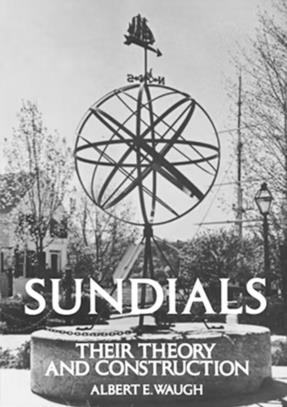
NavList:
A Community Devoted to the Preservation and Practice of Celestial Navigation and Other Methods of Traditional Wayfinding
From: Frank Reed
Date: 2024 May 30, 11:24 -0700
Suppose your sundial is wrong. Its gnomon or "shadow stick" is inclined at an incorrect angle, not equal to your latitude (for most common sundial designs). How bad would that be? What error would be introduced in the time reading from the sundial?
A few minutes ago, I posted an image from a book cover of the "armillary sphere" sundial at Mystic Seaport Museum which is located directly in front of the Treworgy Planetarium. It has been there since the planetarium opened (c.1960... like many small planetariums, this one was inspired in part by "Sputnik panic"). This armillary sphere was apparently constructed by the author of the same "Sundials" book which has had this image on its cover for decades. But it's a little embarrassing: it was built wrong. The gnomon is inclined, at at angle not equal to the latitude, about 41.36°, but instead it's inclined at the co-latitude or 48.64°. You can measure it in the photo. The style of the thing does not make it possible to re-tilt it in any efficient way, so there it is, wrong by 7° for over sixty years!
How bad can it be? Does anyone "gnow"?? I investigated the correction many years ago, but I don't recall the details. In general, if a sundial is tilted with some angular error, what is the error in the HA (or "hour angle" or "Local Apparent Time") that we read from the dial, presumably as a function of the HA itself and probably the Sun's Declination? Let's assume for now that there is no error in azimuthal orientation --the gnomon is at least aligned in the plane of the north-south meridian.
No visitors to the museum have ever independently noticed this problem, as far as I am aware. This sundial has a correction table for the equation of time plus time zone offset and instructions to add an hour for "daylight time". In short, from the perspective of most folks, it's wrong already! In addition, simply finding the bar-like shadow with the relatively sharp edges and understanding that this is the shadow to read the time is now alien to most people. Sundials are decorative, public art, in the modern world.
On a related note, for celestial navigation, if I take a standard morning or afternoon Sun sight with a sextant and process it to yield hour angle (a "sundial" analysis of the sight), but I use the wrong latitude in the calculation, is the resulting error similar to the actual sundial case?
Frank Reed
Clockwork Mapping / ReedNavigation.com
Conanicut Island USA






